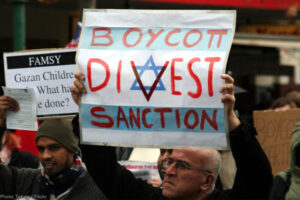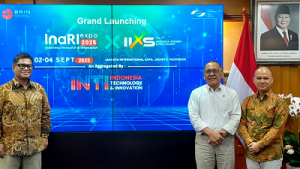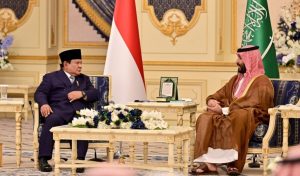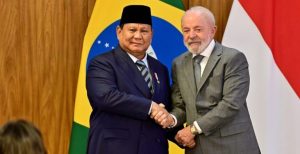 Den Pasar, Bali, 29 Jumadil Awwal 1435/30 March 2014 (MINA) – Saudi Arabia is very upset with the direction which US President Barack Obama has been leading American foreign policy in the Middle East, but the kingdom is not in a position to do anything about it, a political commentator says.
Den Pasar, Bali, 29 Jumadil Awwal 1435/30 March 2014 (MINA) – Saudi Arabia is very upset with the direction which US President Barack Obama has been leading American foreign policy in the Middle East, but the kingdom is not in a position to do anything about it, a political commentator says.
International lawyer Barry Grossman, who is based in Indonesia’s Bali island, made the remarks on Saturday during a telephone interview with Press TV.
He was commenting on Obama’s Friday visit to Riyadh where he reportedly reassured disconcerted Saudi King Abdullah that Washington would continue to support certain groups of insurgents in Syria and reject “a bad nuclear deal” with Iran, Press TV quoted by Mi’raj Islamic News Agency (MINA) as reporting, Sunday.
“Let’s first recognize that the president of the United States does not have a completely free hand to set the US foreign policy. And in so far as Obama is genuine in backpedalling against the traditional foreign policy in the region, obviously he is running into some resistance,” Grossman said.
Also Read: Last Batch of Indonesian Hajj Pilgrims Depart from Madinah
“The second point worth making is that the security of the Saudi regime is secured entirely by the United States and the military hardware sold by to the Saudis by the US remains, for all practical intents and purposes, under the control of the US. The same military that surrounds Iran, with striking distance of Saudi Arabia, which itself has five military bases in it,” he added.
“So, the Saudis are really not in a position to lecture the US. The Saudis are clearly very unhappy with what Obama’s foreign policy has reached. They are particularly unhappy about the Obama administration backing away from the Syria project and the Iran project. But there is really very little that Saudis can do about it,” Grossman noted.
“The main point is that the Saudis are clearly very upset with the direction which Obama has been leading its foreign policy in the region. They are very upset that Obama has backed off from the Syria project; they are very upset that Obama indicated that he would veto any further sanctions against Iran. They are upset that the 5+1 group is negotiating with Iran. They are upset that essentially the US does not seem prepared to toe the Israeli line on Iran and the allegation that Iran is somehow mysteriously producing nuclear weapons,” he stated.
“Now, there is something very important and it needs to be understood, and that is simply this: between 2007 and 2013, each and every year the United States’ 16 security agencies, in their report to the Senate Select Committee on Intelligence, said exactly the same thing. They said, in each of these occasions, and most recently only a few months ago, that any such nuclear weapons program, as the US believed that Iran once had, was completely halted in 2003,” Grossman emphasized.
Also Read: Fourth Day of Weather Modification Operations: BNPB Disburses 16 Tons of Seeding Material
“They say in each of these security briefings, which have since been declassified, that there has been no evidence whatsoever that Iran is pursuing a nuclear weapons capacity. They have said the Iranian leadership has not made any decisions to pursue a nuclear capacity,” he said.
Iran and the P5+1 group talks
Iran and the five permanent members of the UN Security Council — Britain, China, France, Russia, and the United States — plus Germany signed an interim nuclear agreement in Geneva, Switzerland, last November.
Under the Geneva agreement, the Sextet agreed to provide Iran with some sanctions relief in exchange for Tehran agreeing to limit certain aspects of its nuclear activities during a six-month period.
Also Read: Dozens of Volunteers Attend Rumah Zakat’s Basic Training in Bogor
Iran and the P5+1 group continued their talks in the Austrian capital Vienna last month in order to reach a final agreement. According to Iranian Deputy Foreign Minister Abbas Araqchi, the talks concluded on February 20 with “an agreement on the framework and plan of action for the comprehensive nuclear talks”.
The illegal US-engineered sanctions on Iran have been imposed based on the unfounded accusation that Tehran is pursuing non-civilian objectives in its nuclear energy program.
Iran rejects the allegation, arguing that as a committed signatory to the nuclear Non-Proliferation Treaty (NPT) and a member of the International Atomic Energy Agency (IAEA), it has the right to use nuclear technology for peaceful purposes.
In addition, the IAEA has conducted numerous inspections of Iran’s nuclear facilities but has never found any evidence showing that Iran’s civilian nuclear program has been diverted to nuclear weapons production. (T/E01/IR)
Also Read: Boycott Impact: Starbucks Closes 11 Stores in Indonesia
Mi’raj Islamic News Agency (MINA).




























 Mina Indonesia
Mina Indonesia Mina Arabic
Mina Arabic